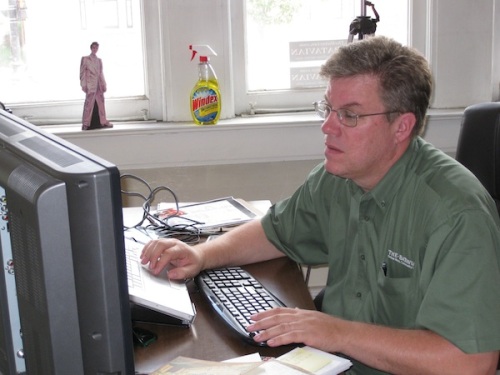If you haven’t heard AOL chief executive Tim Armstrong’s nauseating conference call with Patch employees — complete with the mid-call firing of Patch creative director Abel Lenz, who had the audacity to take the great man’s photo — then by all means avail yourself of the opportunity. (Via Jim Romenesko, who has been diligently tracking the story of Patch’s woes.)
[soundcloud url=”http://api.soundcloud.com/tracks/104878948″ params=”” width=” 100%” height=”166″ iframe=”true” /]
The end seems to be near for Patch, AOL’s network of hyperlocal websites, which never had a business model that made sense. Given that Patch is failing in precisely the way it was predicted to fail (see, for instance, this archive of Patch articles at Business Insider), Friday’s conference call was a time for Armstrong to show some decency and humility — not to strut around like a ’roided-up rooster.
The cuts Armstrong announced were devastating — over the next week, hundreds of employees will be laid off and around 400 Patch sites will be closed or somehow partnered with other sites, according to Darrell Etherington of TechCrunch. That’s nearly half of Patch’s 900 or so sites.
At this point, the most merciful thing Armstrong could do is shut down the whole thing and help the hard-working local editors become owner-operators. I suspect many of these sites could be viable if the corporate bureaucracy AOL has laid on top of them were removed.
Howard Owens, publisher of The Batavian, an independent online news site in western New York, makes a compelling case at NetNewsCheck that the economies of scale AOL promised not only haven’t materialized, but that putting together a vast network of hyperlocal site actually costs more than launching independents. The problems, he writes, include enormous tech investments and highly paid supervisors at corporate headquarters:
Armstrong chased scale: IT infrastructure scales, server farms scale, message systems scale, cloud computing scales. But local news does not scale.
Widget makers understand scale. The most expensive widget is the first one. Each new widget is comparatively pennies on the dollar.
In the news business, the first story costs just as much as the third or the 30th or the last. Online, it’s possible to get more production out of a single reporter, but time is not elastic. At the end of the day comes the end of the day.
What Armstrong should have done, Owens adds, is fund independent start-ups — an idea that AOL could still pursue, writes City University of New York journalism professor Jeff Jarvis at his blog, Buzz Machine. Jarvis offers this advice to Armstrong:
Set up independent entrepreneurs — your employees, my entrepreneurial graduates, unemployed newspaper folks — to take over the sites. Offer them the benefit of continued network ad sales — that’s enlightened self-interest for Patch and Aol. Offer them training. Offer them technology. And even offer them some startup capital.
You could end up better off than you ever were by being a member of an ecosystem instead of trying to own it.
Whether AOL steps or not, at least one other funding source for converting Patches into independent news sites has emerged. Over the weekend Debbie Galant, co-founder of the pioneering hyperlocal site Baristanet and now the director of the New Jersey News Commons at Montclair State University, announced on Twitter that her program was ready to offer grants and training to New Jersey Patch employees who lose their jobs. (There are 89 Patch sites in New Jersey, according to Patch’s online listings.)
As I found in “The Wired City,” hyperlocal online news is alive and well, with a variety of nonprofit and for-profit sites thriving. But as Owens says, local doesn’t scale. Independence and grassroots control are keys. Chain ownership was deadly to the newspaper business, and it was never a good idea for online news, either.
If the demise of Patch can lead to something better, then let’s get started.




 A malicious computer virus known as “Darkleech,” which has hit
A malicious computer virus known as “Darkleech,” which has hit 
